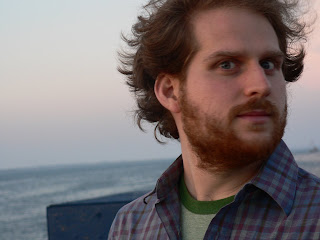

This post is for Farrah, who like a Wild West homesteader knocking pressure-treated fence posts into the ground before the surveyors come with their railroads and organic certifications, has just started her own blog which is wonderfully like and unlike her. In her newbie zeal she has been encouraging me to get back in the game, and as if to join the chastening chorus I just got an email about a poetry reading next week in Brooklyn that included the following bio line: "blogs actively at..." Lest I blog inactively:
This post is also, necessarily, for insomnia, which I now suffer out of jetlag on holiday and for the location in which I am located, in a city so fanciful it threatens to tear down pragmatic notions of what cultural projects are possible; even as the snow-globe relic of itself it seems at the border of fiction. In fact it feels like it vitiates such distinctions: dream and non-dream, rational and non-rational. So this post is then also for vitiating distinctions. Yesterday I spent the evening with tired feet tromping over bridges in a Harlequin mask.


Tonight, however, while Farrah has been typing away I have been catching up on last month's magazines and was fascinated by the (vitiate-able?) distinction that the New Yorker a few issues back seems to enact between two visions of fiction in an unintended contrast of articles, one a plummy and leonine profile of Ian McEwan, the other a bit of squinty spelunkery into the early works of Donald Barthelme. McEwan seemed to me to come off as a kind of lacquered alien -- not Martian, more pod-man -- ostensibly invoking Freud as a source of his violent surgeries of books, but exclusively the supposed-to-know doctor who endoscopes diagrams, not muddles of squish. The article seems to raise the specter of a link between rationalism and psychopathy, and is almost parodic in its antispectic vision of the novelist as bricklayer (though, wonderfully, we discover that, unlike his late-discovered journeyman half-brother. McEwan is a terrible actual bricklayer). Unsuperstitious, McEwan happily divulges his unfinished, even unwritten plots, reads pieces from scenes, seems even to view scenes as scenes at all, essentially detachable pieces that require different attentions.
I remember being once naively shocked at the notion of moviemaking as a checklist of necessary images, the mantra do we have the shot, as opposed to, what are we going to do today. As a poet I feel often like the latter is how I write, like these literal labyrinth streets here in city-land that may require indecent backtracking past the next canted corner. I'm constantly creating and honoring vestigiality, which seems weirdly beside the point to McEwan's happies and unhappies. Barthelme, on the other hand, seems vaguely kindred with his collage-ist grin. My favorite quotation in the article has Barthelme cri-de-coeuring grungy language like a refreshing raw egg plopped in a whiskey shot: "The confusing signals, the impurity of the signal, gives you verisimilitude. As when you attend a funeral and notice, against your will that it's being poorly done."
Barthelme is presented in the article as a blurry post-modernist but, in a very tricksy rationalist way, the article anatomizes post-modernism to reinforce modernism, to mean it will never go away not ever again: dream the baby dreams about peek-a-boo fragments. The article, in which New Yorker is necessarily both frustrating foreground and background, reminded me of an argument that I had with the idea of Barthelme when I first read him, and this odd firewall that keeps his work apart from the similar thrust of poetry I most appreciate to chunk up its sentences and knock them against each other. (The bad brickworker once again, I suppose, but better.) The problem, I keep writing about these days, is whether people in stories are necessary to people or to stories. Is the story just public relations, suppository with sentences inside? Is it the expectation of a difference that needs to be torn down? Yes, tear down that wall, Mister - or Signore - Whomever, equals a pile of bricks.

In this city of watery places I'm tempted to another metaphor, wandering up and down streets in search of a bridge, and there is no bridge. In Jim Henson's movie Labyrinth a big sad fuzzy creature (Barthelme, possibly inspired by Meret Oppenheim's fur teacup: "The aim of literature is the creation of a strange object covered with fur which breaks your heart.") produces a howl of despair and woe that magically raises empathetic rocks from the squishy depths that the protagonists may cross. There's something there in that quizzical relation between the wail of surrender and the exit ex machina. There's this science of putting it all together and then, there's something else.

